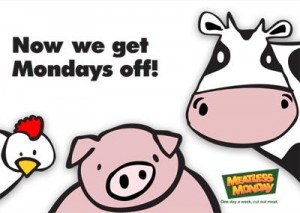Bye Bye Bacon
 Now that I am determined, motivated, and pretty darn excited to begin my meat-less expeditions, I have been observing my normal daily behaviors to see how unsustainable they have been. First, I noticed that I eat meat purely for convenience reasons. To be honest, I am not even a fan of the taste of chicken, hamburgers, steak, or ham. Mainly, I eat it for the fact that it’s found in a much more accessible location than the vegetables and vegetarian options in the dining halls. My friends eat it, and it looks appetizing on their plate, so I eat it to. Especially if I’m tired, lazy, or bummed- chicken fingers and fries are what I crave. Or my mom’s spaghetti and meatballs. All meat, all the time. I somehow have this perception that meat is filling, and I will remain hungry if I fill up on anything else. By observing my behaviors, I realize it’s definitely time to make a change. And to be quite frank, I am definitely way too late.
Now that I am determined, motivated, and pretty darn excited to begin my meat-less expeditions, I have been observing my normal daily behaviors to see how unsustainable they have been. First, I noticed that I eat meat purely for convenience reasons. To be honest, I am not even a fan of the taste of chicken, hamburgers, steak, or ham. Mainly, I eat it for the fact that it’s found in a much more accessible location than the vegetables and vegetarian options in the dining halls. My friends eat it, and it looks appetizing on their plate, so I eat it to. Especially if I’m tired, lazy, or bummed- chicken fingers and fries are what I crave. Or my mom’s spaghetti and meatballs. All meat, all the time. I somehow have this perception that meat is filling, and I will remain hungry if I fill up on anything else. By observing my behaviors, I realize it’s definitely time to make a change. And to be quite frank, I am definitely way too late.
Eating meat itself is generally known to be damaging to the environment, however that is a huge understatement. Raising animals for food not only harms our environment by the overuse of resources, but it pollutes our water and air, causes soil erosion, and drastically adds to global warming itself. In my opinion, these reasons are reasons enough to quit meat-eating cold turkey, (see what I did there.)
However, many issues arise out of the fact that many earthlings want to become vegetarian or vegan. “Raising livestock is the primary livelihood of 36% of the world’s poorest individuals” (Henning, 2011), explaining why this has become controversial. Not only will many people be losing their jobs and livelihood by the minimization of livestock growth, but this oversteps cultural and ethical bounds as well. Raising livestock is an extremely important part of many cultures, and who are we to be changing that? There is some controversy regarding whether that is more important than our dwindling environment, but that’s something that cannot be determined overnight. Going back to my main point, there needs to be a change in meat consumption. Henning states, “the livestock sector may now be the single greatest source of freshwater use and pollution…the leading cause of rainforest deforestation, and the driving force behind spiraling species extinction…livestock production is among the largest sectorial sources of greenhouse gas emissions contributing to global climate change.” Not only is this such an alarming yet frightening statement, but if you feel comfortable stuffing a piece of rare, juicy, filet mignon in your mouth after you read it, I may recommend re-evaluating your morals at this point.
Eliminating meat consumption out of my diet for at least two days of the week will make more of a change than I thought, especially if I continue with it for a long period of time and encourage my friends to partake in it with me. The more people who change this behavior, the better off we will all be. Greenhouse gas emissions from livestock production is extremely relevant to my sustainable behavior change because it truly opened my eyes to why eating meat is so detrimental to our environment, and this journal article will continue to remind me why I am limiting my meat consumption.
And on that note, I say goodbye to my cheeseburger with pride.
Henning, B. (2011). Standing in livestock’s ‘Long Shadow’: The Ethics of Eating Meat on a Small Planet. Ethics in the Environment, 16(2), 1-33.
Leave a Reply